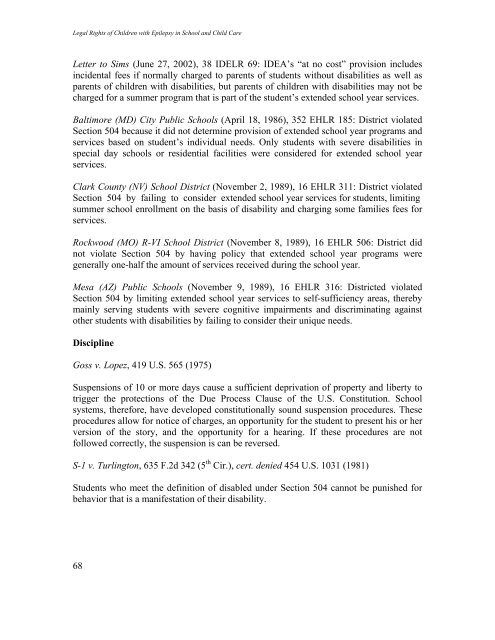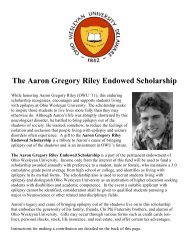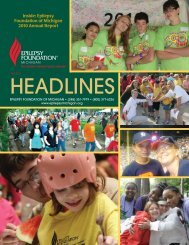Legal Rights of Children with Epilepsy in School & Child Care
Legal Rights of Children with Epilepsy in School & Child Care
Legal Rights of Children with Epilepsy in School & Child Care
Create successful ePaper yourself
Turn your PDF publications into a flip-book with our unique Google optimized e-Paper software.
<strong>Legal</strong> <strong>Rights</strong> <strong>of</strong> <strong><strong>Child</strong>ren</strong> <strong>with</strong> <strong>Epilepsy</strong> <strong>in</strong> <strong>School</strong> and <strong>Child</strong> <strong>Care</strong><br />
Letter to Sims (June 27, 2002), 38 IDELR 69: IDEA’s “at no cost” provision <strong>in</strong>cludes<br />
<strong>in</strong>cidental fees if normally charged to parents <strong>of</strong> students <strong>with</strong>out disabilities as well as<br />
parents <strong>of</strong> children <strong>with</strong> disabilities, but parents <strong>of</strong> children <strong>with</strong> disabilities may not be<br />
charged for a summer program that is part <strong>of</strong> the student’s extended school year services.<br />
Baltimore (MD) City Public <strong>School</strong>s (April 18, 1986), 352 EHLR 185: District violated<br />
Section 504 because it did not determ<strong>in</strong>e provision <strong>of</strong> extended school year programs and<br />
services based on student’s <strong>in</strong>dividual needs. Only students <strong>with</strong> severe disabilities <strong>in</strong><br />
special day schools or residential facilities were considered for extended school year<br />
services.<br />
Clark County (NV) <strong>School</strong> District (November 2, 1989), 16 EHLR 311: District violated<br />
Section 504 by fail<strong>in</strong>g to consider extended school year services for students, limit<strong>in</strong>g<br />
summer school enrollment on the basis <strong>of</strong> disability and charg<strong>in</strong>g some families fees for<br />
services.<br />
Rockwood (MO) R-VI <strong>School</strong> District (November 8, 1989), 16 EHLR 506: District did<br />
not violate Section 504 by hav<strong>in</strong>g policy that extended school year programs were<br />
generally one-half the amount <strong>of</strong> services received dur<strong>in</strong>g the school year.<br />
Mesa (AZ) Public <strong>School</strong>s (November 9, 1989), 16 EHLR 316: Districted violated<br />
Section 504 by limit<strong>in</strong>g extended school year services to self-sufficiency areas, thereby<br />
ma<strong>in</strong>ly serv<strong>in</strong>g students <strong>with</strong> severe cognitive impairments and discrim<strong>in</strong>at<strong>in</strong>g aga<strong>in</strong>st<br />
other students <strong>with</strong> disabilities by fail<strong>in</strong>g to consider their unique needs.<br />
Discipl<strong>in</strong>e<br />
Goss v. Lopez, 419 U.S. 565 (1975)<br />
Suspensions <strong>of</strong> 10 or more days cause a sufficient deprivation <strong>of</strong> property and liberty to<br />
trigger the protections <strong>of</strong> the Due Process Clause <strong>of</strong> the U.S. Constitution. <strong>School</strong><br />
systems, therefore, have developed constitutionally sound suspension procedures. These<br />
procedures allow for notice <strong>of</strong> charges, an opportunity for the student to present his or her<br />
version <strong>of</strong> the story, and the opportunity for a hear<strong>in</strong>g. If these procedures are not<br />
followed correctly, the suspension is can be reversed.<br />
S-1 v. Turl<strong>in</strong>gton, 635 F.2d 342 (5 th Cir.), cert. denied 454 U.S. 1031 (1981)<br />
Students who meet the def<strong>in</strong>ition <strong>of</strong> disabled under Section 504 cannot be punished for<br />
behavior that is a manifestation <strong>of</strong> their disability.<br />
68








